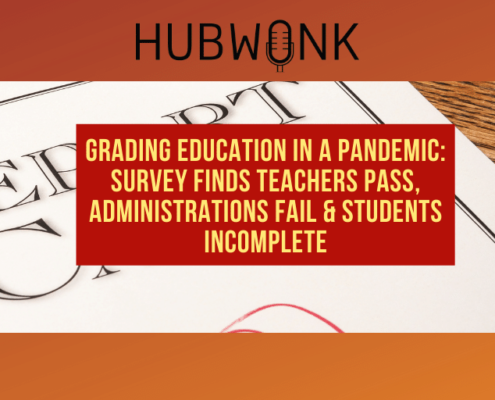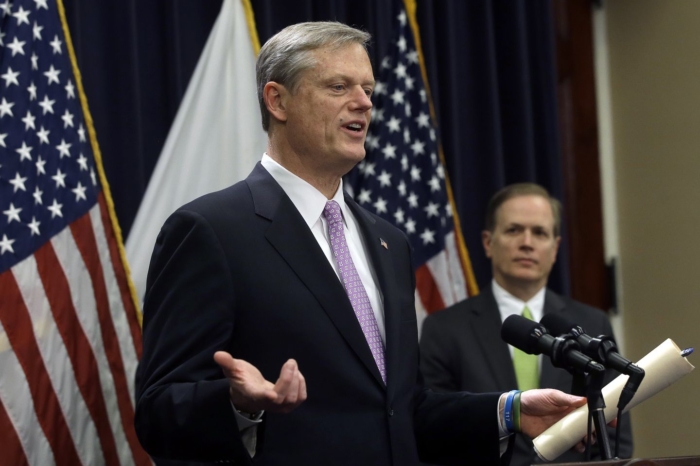Tell state & school leaders to ensure our kids get a quality education this fall!
/0 Comments/in News /by Editorial Staff Share on Facebook
Share on Twitter
Share on
LinkedIn
+
As the coronaviruscontinues in Massachusetts this fall, the education of our children should be atop priority for our state & school district leaders. Many schools didn’tcontinue rigorous instruction during the shutdown.
They didn’t provide dailyschedules, take attendance or ensure daily interaction between teachers andstudents – as a result, our kids lost a third of their academic year.
MA state &district leaders are making school re-opening plans now, that could includeat-home schooling and hybrid options in the fall.
Sign the petition below and tell them that our kids need to continue to learn even if they’re not in a school building.
View our additional education resources:

Georgetown’s Dr. Marguerite Roza on K-12 School Finance, Spending, & Results
This week on “The Learning Curve," Gerard and Cara talk with Dr. Marguerite Roza, Research Professor and Director of the Edunomics Lab at Georgetown University. Professor Roza describes the three distinct phases of how American K-12 education has been funded over the last 40 years, and implications for equity and overall student achievement.

“Be Strong, Saith My Heart” – National Poetry Month – 40 Resources for K-12 Students
In Pioneer’s ongoing series of blogs on curricular resources for parents, families, and teachers during COVID-19, this one focuses on: Celebrating National Poetry Month.

Stanford’s National Humanities Medal Winner Prof. Arnold Rampersad on Langston Hughes & Ralph Ellison
This week on “The Learning Curve," Gerard and Cara talk with Professor Arnold Rampersad, the Sara Hart Kimball Professor Emeritus in Humanities at Stanford University and recipient of the National Humanities Medal for his books including The Life of Langston Hughes and Ralph Ellison: A Biography.

The Washington Post’s Jay Mathews on An Optimist’s Guide to American Public Education
This week on “The Learning Curve," Gerard and Cara talk with Jay Mathews, an education columnist for The Washington Post and author of the recent book, An Optimist's Guide to American Public Education. Jay describes the three key trends in K-12 schooling that he views as cause for hope.

Grading Education in a Pandemic: Survey Finds Teachers Pass, Administrations Fail & Students Incomplete
This week on Hubwonk, Joe Selvaggi discusses a recently released survey from Pioneer Institute and Emerson Polling, "Massachusetts Residents’ Perceptions of K-12 Education During the Covid-19 Pandemic," with Emerson's lead analyst, Isabel Holloway, and Pioneer Institute’s Charlie Chieppo.

Poll Finds Mixed Views About Schools’ Pandemic Performance
A year into the COVID-19 pandemic, Massachusetts residents have mixed opinions about how K-12 education has functioned, but they tend to view the performance of individual teachers more favorably than that of institutions like school districts and teachers’ unions, according to a poll of 1,500 residents commissioned by Pioneer Institute.

BBC Classics Prof. Bettany Hughes on Athenian Democracy, Socrates, & the Goddess Aphrodite
This week on “The Learning Curve," Gerard and Cara talk with Professor Bettany Hughes, award-winning historian, BBC broadcaster, and author of the best-selling books Helen of Troy: Goddess, Princess, Whore; The Hemlock Cup: Socrates, Athens, and the Search for the Good Life; and Venus and Aphrodite: History of a Goddess. Prof. Hughes shares insights from her most recent book about the ancient deity known as Venus to Romans and Aphrodite to the Greeks, and her impact on our understanding of the mythology and history of beauty, romance, and passion.

Dartmouth’s Prof. Susannah Heschel Discusses Rabbi Abraham Joshua Heschel & the Civil Rights Movement
This week on “The Learning Curve," Gerard and Cara talk with Dr. Susannah Heschel, the Eli M. Black Distinguished Professor of Jewish Studies at Dartmouth College, and the daughter of noted 20th-century Jewish theologian and Civil Rights-era leader, Rabbi Abraham Joshua Heschel. They discuss what teachers and students today should know about Rabbi Heschel’s life and legacy.

Hoover Institution’s Dr. Eric Hanushek on COVID-19, K-12 Learning Loss, & Economic Impact
This week on “The Learning Curve," Gerard and Cara talk with Dr. Eric Hanushek, the Paul and Jean Hanna Senior Fellow at Stanford University’s Hoover Institution. They discuss his research, cited by The Wall Street Journal, on learning loss due to the pandemic, especially among poor, minority, and rural students, and its impact on skills and earnings.

UK Classics Scholar Kathryn Tempest on Cicero, Brutus, & the Death of Caesar
This week on “The Learning Curve," Gerard and Cara talk with Dr. Kathryn Tempest, a Reader in Classics and Ancient History at the University of Roehampton in London, UK, and author of Cicero: Politics and Persuasion in Ancient Rome and Brutus: The Noble Conspirator. They discuss the historical, civic, and moral lessons political leaders, educators, and schoolchildren today can learn by studying the Roman Republic and the lives of key figures from that era such as Cicero and Brutus.

Best-Selling, Netflix Author Loung Ung On Surviving Pol Pot’s Killing Fields
This week on “The Learning Curve," Gerard and Cara talk with Loung Ung, a human-rights activist; the author of the bestselling books First They Killed My Father: A Daughter of Cambodia Remembers, Lucky Child, and Lulu in the Sky; and a co-screenwriter of the 2017 Netflix Original Movie, First They Killed My Father. Ms. Ung shares her experiences living through genocide under Pol Pot and the Khmer Rouge from 1975 to 1979, which resulted in the deaths of nearly a quarter of Cambodia's population.

American Federation for Children’s Tommy Schultz on School Choice & Edu Federalism
This week on “The Learning Curve," Gerard and Cara talk with Tommy Schultz, CEO-elect of the American Federation for Children (AFC). They discuss how COVID-19 school closures have increased the interest in alternatives to public schools, and what AFC's polling shows on shifts in attitudes toward school choice options in both urban and rural communities.



